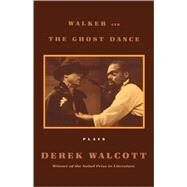Walker and The Ghost Dance Plays
, by Walcott, Derek- ISBN: 9780374528140 | 0374528144
- Cover: Paperback
- Copyright: 8/15/2002
Dazzling dramas on American themes from the Nobel laureate On a cold winter's day on the Dakota plains, Catherine Weldon receives a caller, Kicking Bear, bringing news of Indian rebellion. In the fort nearby, a tiny community splinters apart over how to react. InGhost Dance, first performed in 1989, Walcott turns a story with a foregone conclusion -- Sitting Bull and his Sioux followers will die at the hands of the Army and Indian agents -- into a portrait of life at a crossroads of American history. InWalker, an opera first performed in 1992 and revised for its revival in 2001, Walcott shifts his attention east, taking for his subject David Walker, the nineteenth-century black abolitionist. In Walcott 's hands Walker becomes a classical hero for his people: a leader who is also a poet. Derek Walcottwas born in St. Lucia, the West Indies, in 1930. HisCollected Poems: 1948-1984was published in 1986, and his subsequent works include a book-length poem,Omeros(1990); a collection of verse,The Bounty(1997); and, in an edition illustrated with his own paintings, the long poemTiepolo's Hound(2000). His most recent collections of plays areThe Haitian Trilogy(2001) andWalker and The Ghost Dance(2002). Walcott received the Queen's Medal for Poetry in 1988 and the Nobel Prize in Literature in 1992. He has also been given the 2004 Anisfield-Wolf Lifetime Achievement Award. "And what about our tribe? Speak in me, what? Tell me the voice that lives inside me, what will happen? They will know the rapture of exaltation, the feathers in their hair will make them eagles over the broken mountains, the lakes will enter and prickle their cold skins like the fishes, they will tire like the salmon of a ladder of stones, and not only the Sioux, not only the Sioux, the Arapahos, the Cheyennes, the Brules, the Ogalalas, to the drum in the heart, before the wide silence." fromThe Ghost Dance The Ghost Dancetakes place on a cold winter's day on the Dakota plains, when Kicking Bear brings news of a rebellion to a white widow named Catherine Weldon; when the alarm seeps into the tiny fort nearby, its mixed company splinters apart in the face of the perceived threat. First performed in 1989, it is a parable of American life at a crossroads, drawn from a story with a historical conclusion: Sitting Bull and his Sioux followers will die at the hands of the Army and Indian agents. Walker,first performed as an opera in 1992 and revived (in a revised version) in 2001, is named for David Walker, the nineteenth-century black abolitionist from Boston who advocated violent revolt against slavery and galvanized his generation. In Walcott's hands he is a classic hero, a political leader who is also a poet. In bothWalkerandThe Ghost Dance, Walcott brings to life the broken communities whose charismatic leaders would change American history. "These two verse dramas show 1992 Nobel Prize winner Walcott at the top of his form. They are lean, focused, and powerful . . . These are history plays at their most energetic. Highly recommended."Thomas E. Luddy, Salem State College, Salem, Massachusetts,Library Journal(starred review) "These are history plays at their most energetic. Highly recommended . . . These two verse dramas show 1992 Nobel Prize winner Walcott at the top of his form. They are lean, focused, and powerful. The first,Walker,is a recent revision of an opera, first performed in 1992, which has become a play with music. Centering on the last day in the life of black abolitionist David Walker, in Boston on Thanksgiving Day in 1830, it has a small cast, one set, a limited time frame, and swift movement. When






